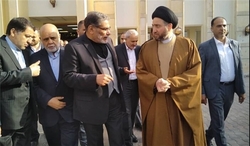 Secretary of Iran’s Supreme National Security Council (SNSC) Rear Admiral Ali Shamkhani held a meeting with prominent Iraqi polticians in Baghdad to discuss different issues of interests for the two neighboring nations.
Secretary of Iran’s Supreme National Security Council (SNSC) Rear Admiral Ali Shamkhani held a meeting with prominent Iraqi polticians in Baghdad to discuss different issues of interests for the two neighboring nations. RNA - During a Sunday meeting at al-Hakim's office, Shamkhani exchanged views with Leader of Iraq's National Wisdom Movement Seyed Ammar al-Hakim, former Iraqi PM Nouri Al-Maleki, acting Prime Minister Heidar al-Ebadi, Head of the Badr Organization Hadi al-Ameri, and head of the PMU Falih al-Fayadh.
Shamkhani left Tehran for Baghdad on Saturday at the head of a high-ranking political and security delegation.
Upon arriving in Baghdad, Shamkhani tweeted that the strong ties between the two countries and nations of Iran and Iraq cannot be ruined.
Last month, a visiting Iraqi judicial delegation agreed with an offer by Iran on forming a joint committee for inquiry into the case of the US terrorist attack against General Soleimani on January 3.
Senior Iraqi judicial officials met with Deputy Iranian Minister of Justice on Human Rights and International Affairs Mahmoud Abbasi in Tehran.
According to Fars News Agency, Abbasi said that Iran has paid heavy human costs for supporting Baghdad government and the Iraqi nation, an example of which was the assassination of General Soleimani, the commander of Quds Force of Islamic Revolution’s Guards Corps, and Abu Mahdi al-Mohandes, the acting commander of the Iraqi Popular Mobilization Units (PMU).
He said that the assassination of General Soleimani by US drones in Baghdad while the Iranian general was officially visiting Iraq as a sovereign country constitutes an international crime in contravention of the UN Charter guaranteeing sovereignty of states.
Iran and Iraq would take the US terrorist attack against commanders of the two sovereign states to the International Court of Justice, the official said.
847/940